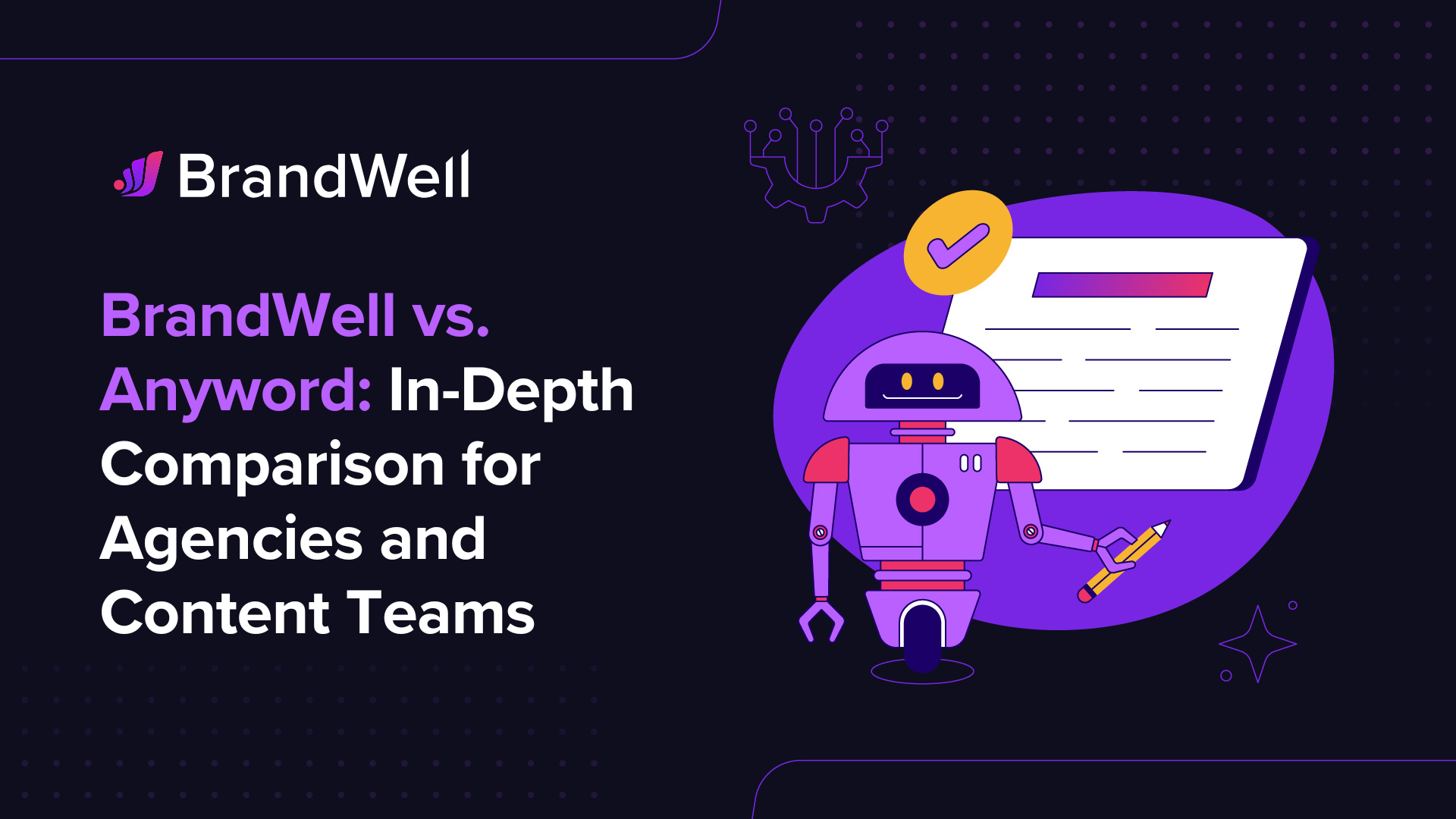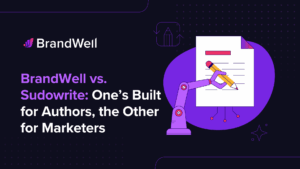Let’s face it: most AI writers are built for bloggers. But as an agency or marketing team, you need something more strategic.
BrandWell and Anyword are both sophisticated writing tools that offer personalization and brand voice designed to drive ROI.
Whether you’re crafting long-form blog posts, Facebook ads, landing pages, or email sequences, BrandWell and Anyword can help your team write smarter, faster, and with more conversion power.
In this post, we compare them side by side so you can see which one best fits your workflow and goals.
Table Of Contents:
- Quick Overview: What BrandWell and Anyword Bring to the Table
- Inside BrandWell: AI Writing, SEO, and Strategy All in One Workspace
- Inside Anyword: Predictive AI for High-Converting Content
- BrandWell vs. Anyword: Head-to-Head Breakdown
- The Verdict: BrandWell vs Anyword
- Which Tool Should You Choose?
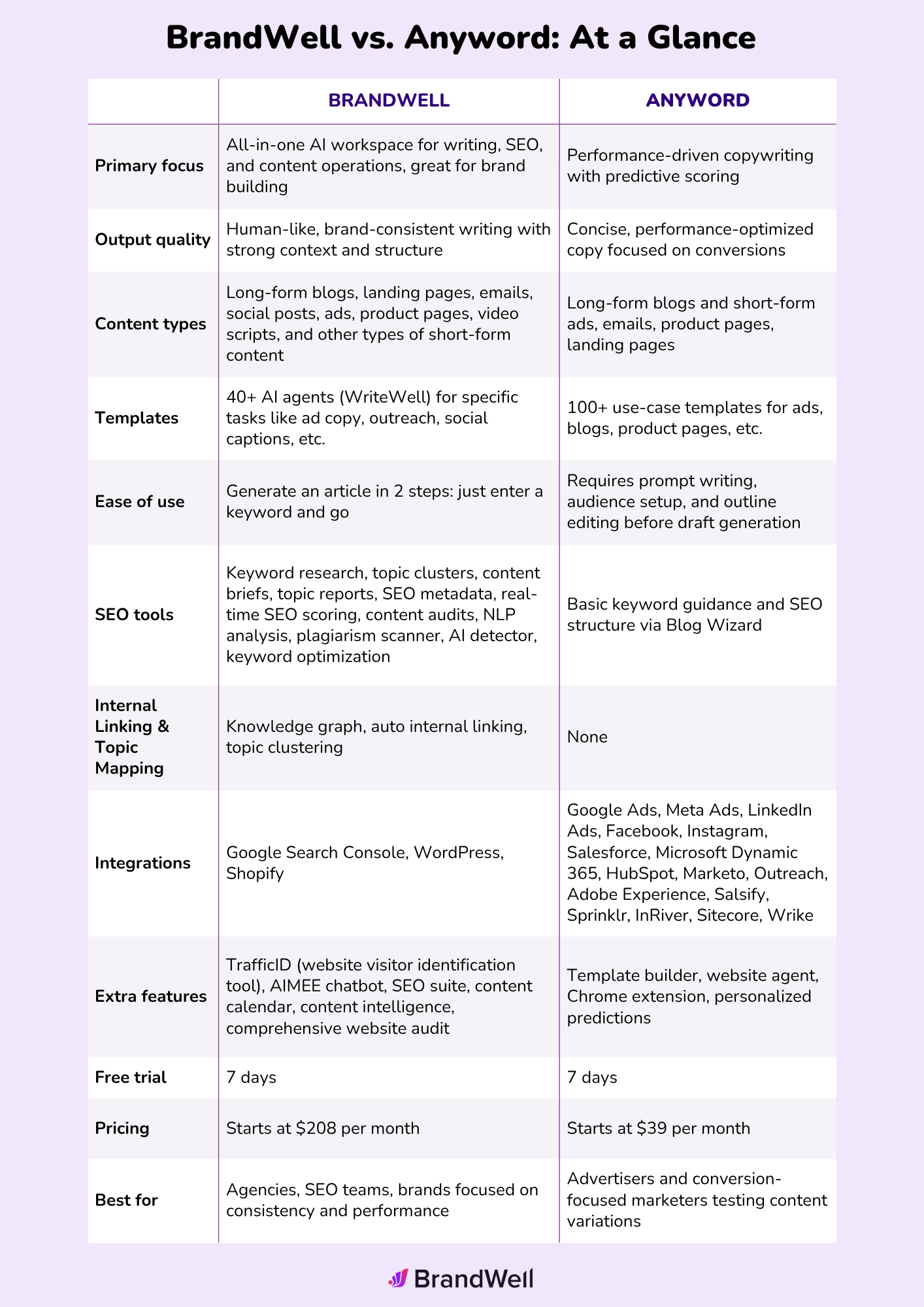
Quick Overview: What BrandWell and Anyword Bring to the Table
BrandWell is an all-in-one content marketing platform built with content teams and marketing agencies in mind. It started as a long-form content generator and has since expanded to include over 40 specialized AI agents for creating various marketing materials, including ad copy, social posts, email campaigns, and more. It also has a conversational chatbot called AIMEE that helps you brainstorm, write, and optimize in real time, making BrandWell feel more like a creative partner than a content tool.
Anyword, on the other hand, is all about performance-driven copy. It uses predictive analytics to score your content so you know how likely it is to convert. From landing pages and product descriptions to paid ads and emails, Anyword lets you tweak your tone, audience, and intent to get the best results. It’s especially popular with advertisers and growth marketers looking to optimize content at scale.
Inside BrandWell: AI Writing, SEO, and Strategy All in One Workspace
BrandWell is a modern AI writing platform built around growing a brand. Its primary function is to help businesses produce content that maintains a consistent brand voice across every channel.
The AI tool analyzes your existing content and “learns” your specific style guides to make sure every new blog post or social media update feels like it came from you. This is a massive benefit for businesses struggling to maintain a cohesive voice, especially with a distributed content team.
BrandWell supports both short-form content and long-form blog posts. It’s a great choice for teams that value a steady and recognizable brand presence in all their media content.
Let’s break down the key features of BrandWell.
RankWell: AI SEO That Feels Like a Full Marketing Team
RankWell is BrandWell’s long-form AI writer. It acts like an entire SEO content team, helping you plan, write, optimize, and publish content that ranks. Whether you’re managing a blog, campaign landing pages, or e-commerce content, RankWell keeps everything tight and search-ready. Here’s what it delivers:
- Keyword Research: Uncover high-potential keywords based on intent, competition, and search trends without leaving your workspace.
- Topic Reports: Instantly generate research-backed summaries of any topic, including search volume, competitor coverage, and key talking points.
- Live SEO Optimization: Score and tweak your content in real time for search engine visibility, readability, and engagement.
- One-Click Publishing: Publish directly to your CMS or blog from within BrandWell — no copy-pasting or tool-switching needed.
- Auto Linking: Automatically suggest and insert internal and external links to boost SEO and improve user experience.
- Auto-Generated Metadata: BrandWell handles the SEO essentials like meta titles, meta descriptions, and URL slugs so you don’t have to.
- Full SEO Suite: From keyword optimization and content scoring to link health checks and plagiarism scans, RankWell covers every SEO angle.
- Content Repurposing: Turn a high-performing blog post, YouTube video, or podcast into fresh, SEO’d long-form content in just a few clicks.
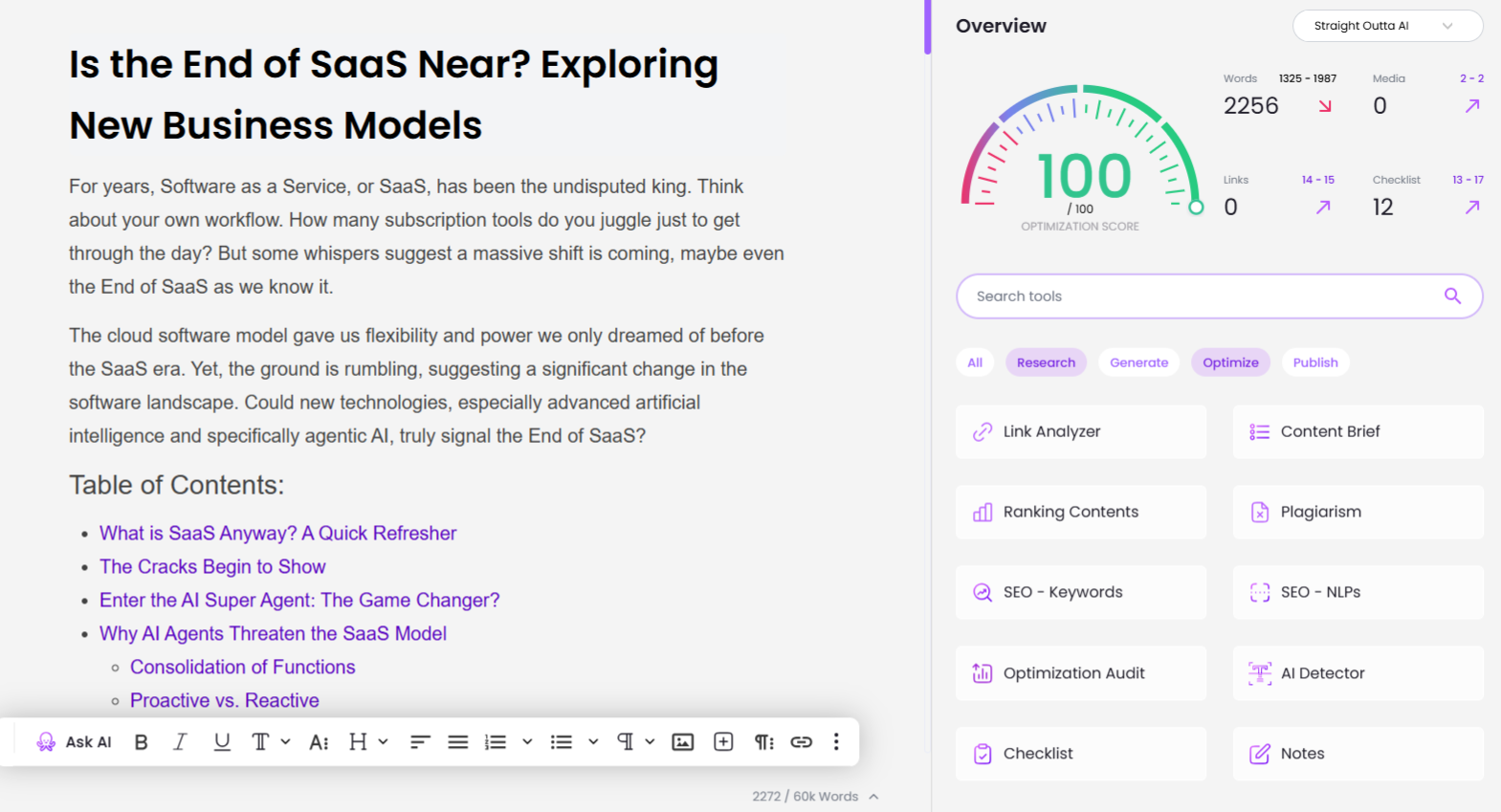
A screenshot of the RankWell editor
For agencies and marketing teams juggling SEO demands across clients or verticals, RankWell offers the scale and precision of an expert-led strategy, without the additional overhead.
WriteWell AI Agents: 40+ Copywriting Specialists at Your Service
BrandWell’s WriteWell agents are like having a team of niche-trained copywriters on call 24/7. Instead of using one generic AI for every task, you get task-specific agents fine-tuned for:
- Social media posts, tailored for platforms like LinkedIn, Instagram, and X
- Ad copy for Facebook, Google, and TikTok
- Email sequences, from cold outreach to re-engagement flows
- E-commerce content, including product descriptions and category pages
- Thought leadership and brand storytelling
- Marketing strategy support, including idea generation and content repurposing
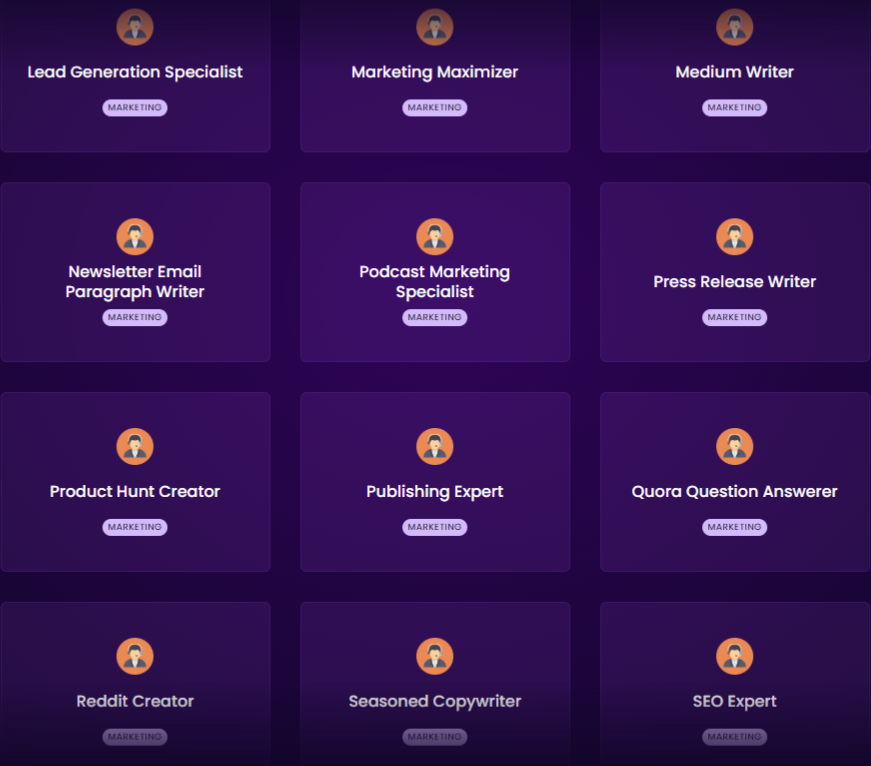
Your short-form content writer with 40+ expert formats
WriteWell makes it easy to knock out diverse content types without bouncing between tools or rewriting everything yourself.
Content Intelligence: Smarter Strategy, Sharper Content
BrandWell’s Content Intelligence suite is a full-stack marketing analyst baked into your writing workflow. It gives you data-driven insights to create content that’s not only well-written but aligned with what actually performs. Here’s what it brings to the table:
- Website Audits: Analyze your (or a client’s) existing content to surface SEO issues, missed opportunities, and underperforming pages worth updating.
- Content Scoring: Get real-time feedback on tone, clarity, structure, SEO, and conversion potential.
- Brand Voice Analysis: Ensure every piece matches your brand’s tone and style, whether you’re writing a blog or a social caption.
- Audience Insights: Tailor your messaging with persona-level suggestions that align with buyer needs, funnel stage, and intent.
- Actionable Optimization Tips: From link opportunities to readability tweaks, BrandWell helps you polish content before it goes live.
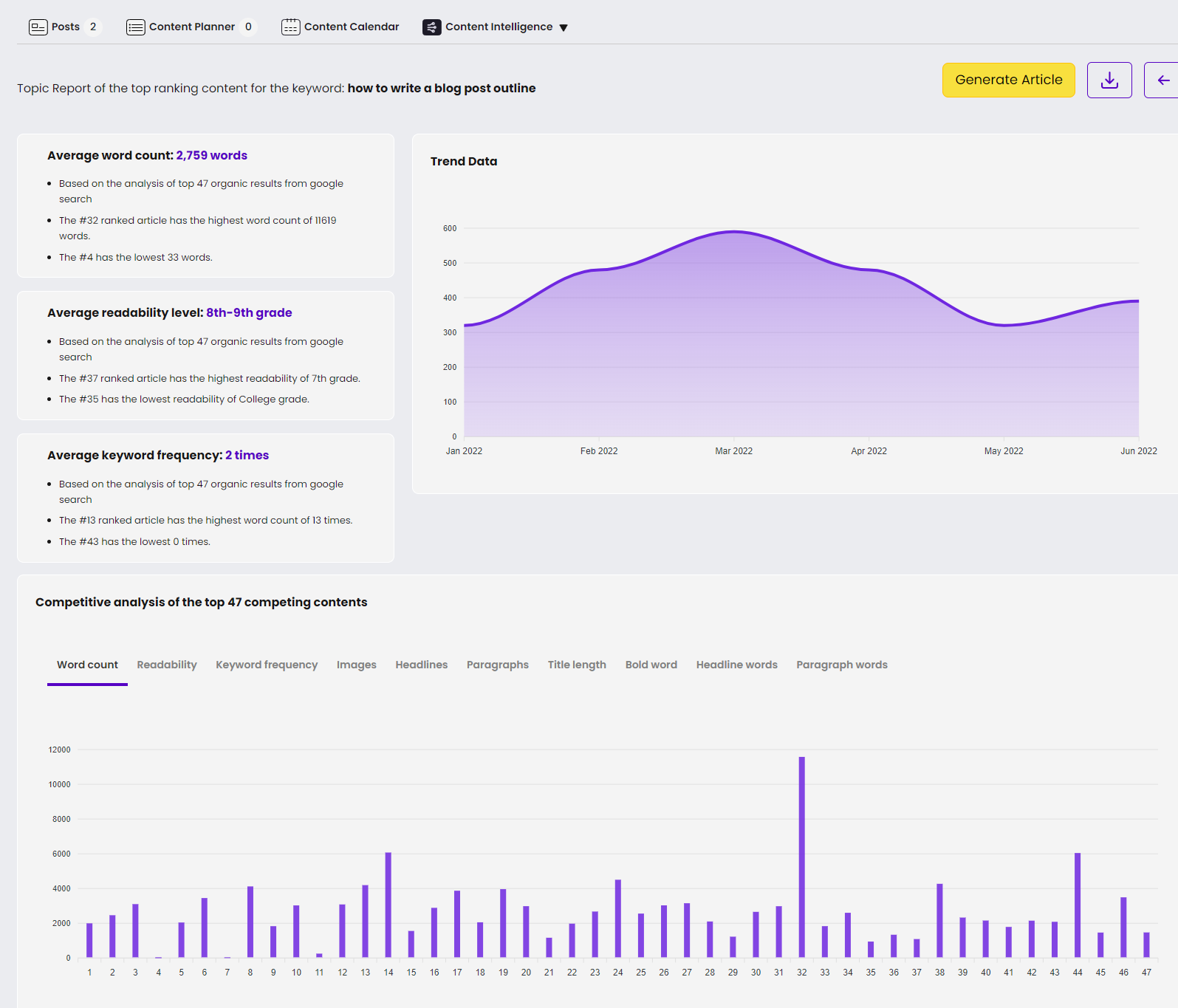
For marketers and agencies managing multiple channels, campaigns, or clients, BrandWell turns raw content into high-performing assets without needing extra tools or plugins.
Inside Anyword: Predictive AI for High-Converting Content
Anyword is known for its powerful predictive performance technology that helps content creators write high-converting copy. The platform is heavily focused on data-driven content that delivers measurable results.
Anyword provides performance scores for your copy, predicting how it will connect with your target audience before you even publish it. These insights can be invaluable for marketers wanting to optimize their content for high conversion rates and better engagement.
The platform also offers 100+ templates for various content types, including social media content and product descriptions. This allows you to quickly produce high-quality material.
Let’s break down the key features of Anyword.
Content Intelligence: Predict What Converts Before You Hit Publish
Anyword’s Content Intelligence platform compares your content to an industry-specific A/B-tested dataset to score every variation of your content for predicted conversions, engagement, and clarity. You can:
- Test headlines, CTAs, and body copy with predictive analytics
- Get audience-specific performance scores
- Identify weak spots and opportunities to optimize messaging
- Benchmark content performance across platforms
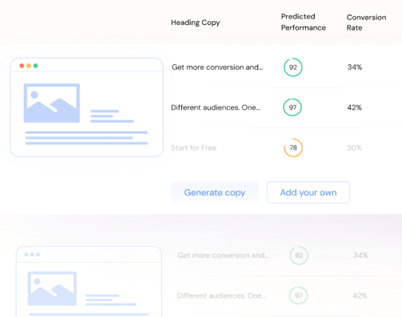
It’s a game-changer for agencies and marketing teams optimizing paid media, landing pages, or email funnels.
Blog Wizard: From Topic to Publish-Ready Post in Minutes
The Blog Wizard helps you go from a blank page to a full-length blog post with minimal effort. Just input a topic, and the AI generates:
- An SEO-friendly outline
- Multiple headline and intro options
- Paragraphs with performance scores
- Suggested CTAs and keyword integration
- Drafts that are written in your custom brand voice, tailored to your custom target audience

You can tweak it as you go or let the wizard build it for you. This is great for keeping your content calendar on schedule without burning out your team.
Short-Form & Long-Form Editors: Built for Multi-Channel Output
Create everything from snappy ads to full-length articles with dedicated editing environments:
- Short-Form Editor: Write high-performing, on-brand ads, emails, and social posts. See real-time performance scores to pick the best variant before publishing.
- Long-Form Editor: Perfect for blogs, articles, and landing pages, complete with optimization tools and predictive guidance to help boost engagement and conversions.
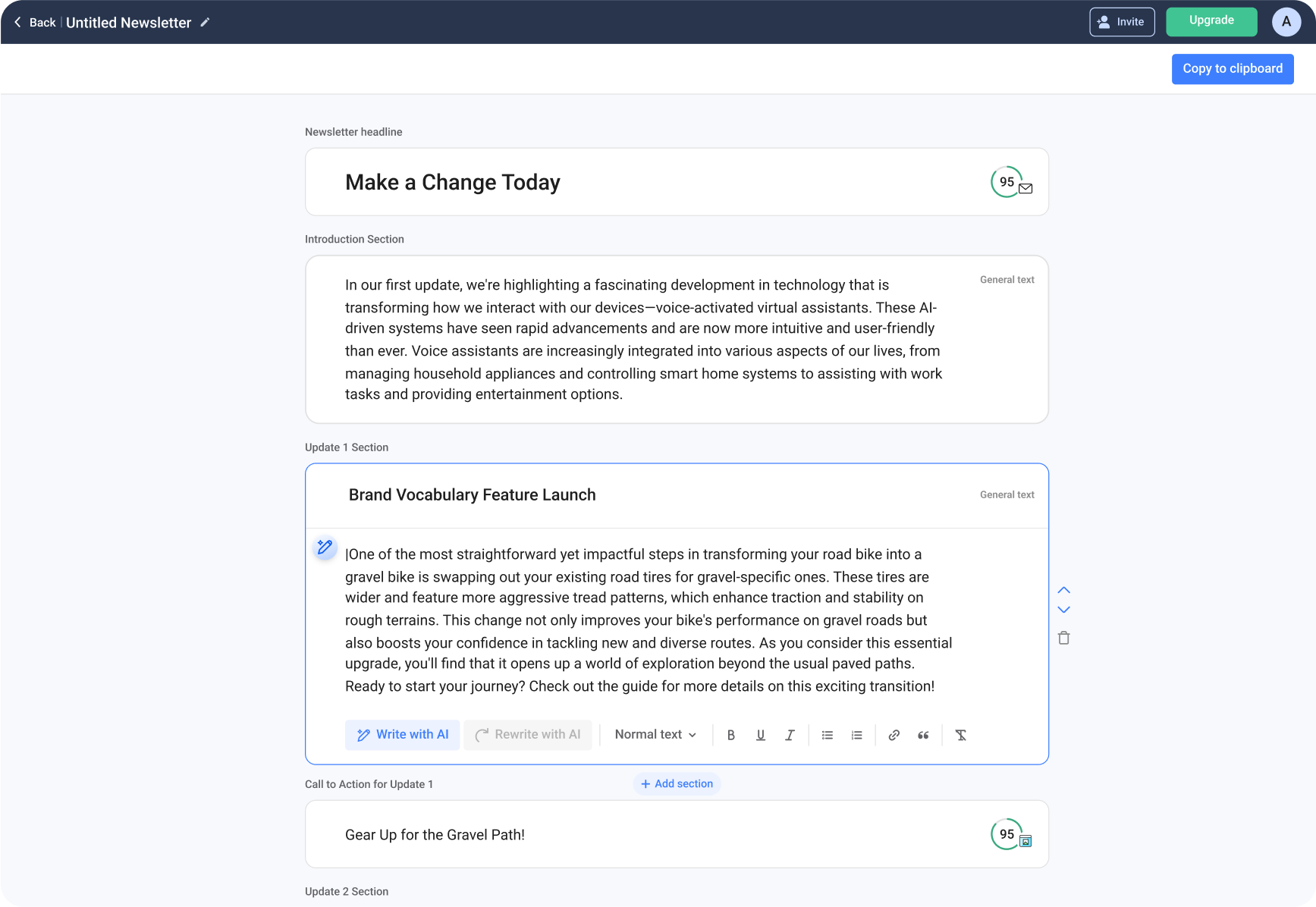
Anyword’s editor works like a coach while you write. It provides:
- Real-time content scoring based on your selected goals (clicks, signups, conversions)
- Rewrite suggestions to boost performance
- Highlighted sections that may need adjusting for tone, clarity, or length
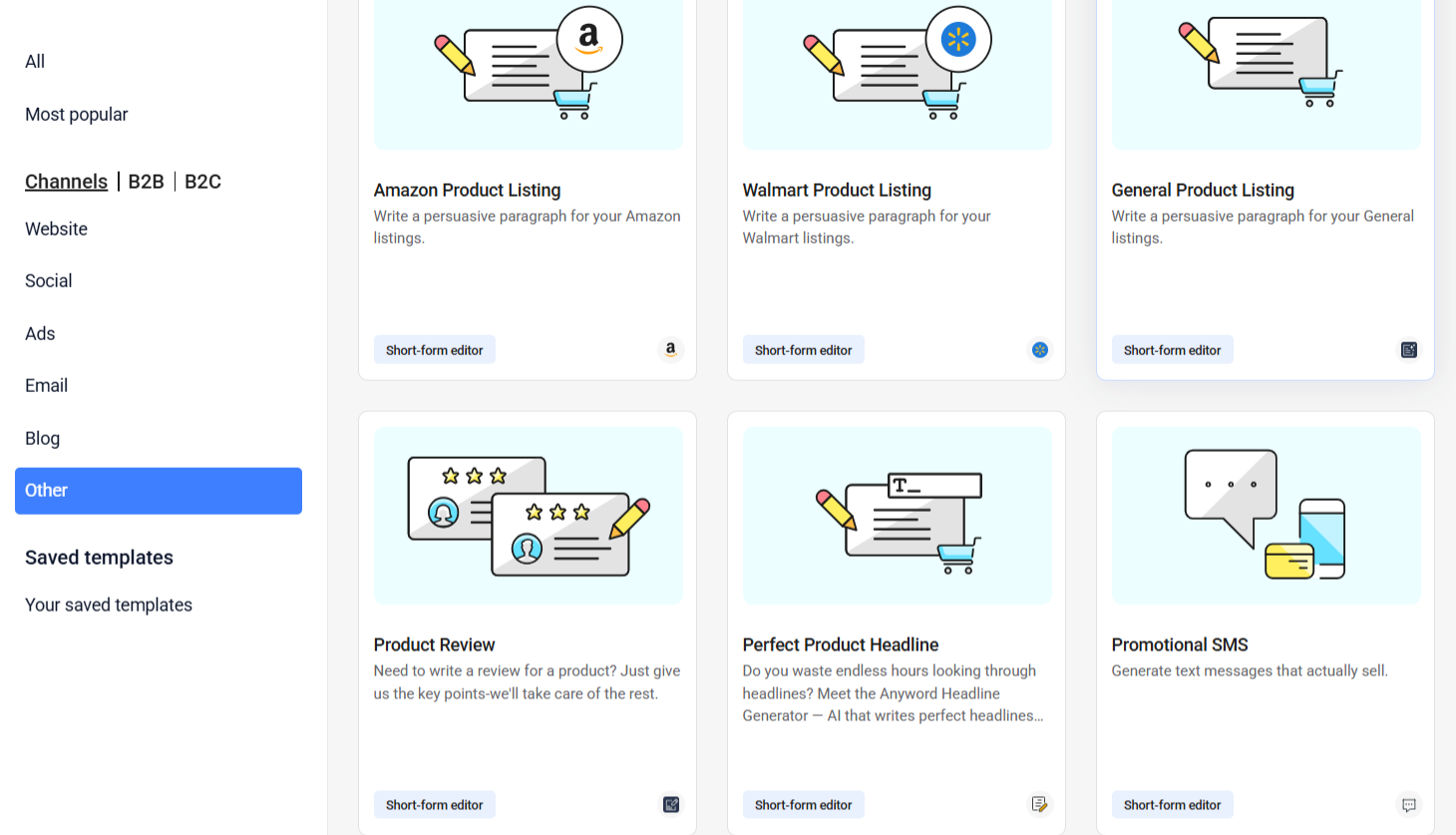
Think of it as an AI content strategist baked right into your editor.
Brand Vocabulary: Keep Your Voice Consistent Everywhere
Anyword’s Brand Vocabulary feature helps you maintain a consistent brand voice across every channel and content type. You can:
- Upload brand-specific phrases, taglines, or tone rules
- Set guidelines for product names, capitalization, and formatting
- Apply your brand voice to blog posts, ads, emails, and more

Perfect for agencies managing multiple clients or in-house teams with strict brand guidelines.
AI Agents: Smarter, Adaptive Content Generators
Anyword’s agents are purpose-built for performance. Each one is trained for a specific use case (ads, emails, product pages, and more) and continues learning from past performance to improve over time.
- Real-time content adaptation across channels
- Data-backed learning loop to improve messaging
- Always-on optimization with minimal manual input
Image Scoring: Predict What Visuals Will Perform Best
Anyword also brings predictive scoring to images. You can:
- Instantly generate visuals and test their predicted engagement
- Align imagery with campaign goals and audience preferences
- Make smarter creative decisions backed by A/B-tested visual data
Website Automation: Scale Copy Across Your Site Without Manual Rewrites
Anyword can also analyze your existing website and generate optimized copy variations for:
- Product pages
- Landing pages
- Category descriptions
- Hero sections and taglines
It even provides predictive scores for each version to help you A/B test and iterate faster without a dev-heavy workflow.
BrandWell vs. Anyword: Head-to-Head Breakdown
Let’s take a closer look at how these two AI platforms stack up across the features that matter most to marketers and agencies. From user experience to content quality and SEO, here’s how they compare side by side.
User Interface and Ease of Use
What’s it like actually working inside BrandWell and Anyword?
Both BrandWell and Anyword have clean, intuitive interfaces. BrandWell’s design feels more contemporary and visually guided, making it simple to use even for those with limited tech skills. Its dashboard presents features clearly, helping to streamline the content workflow from start to finish.
BrandWell feels like a collaborative workspace designed for marketers who juggle multiple content formats daily. Its unified editor lets you access all your RankWell tools as well as your AI agents on the left sidebar.
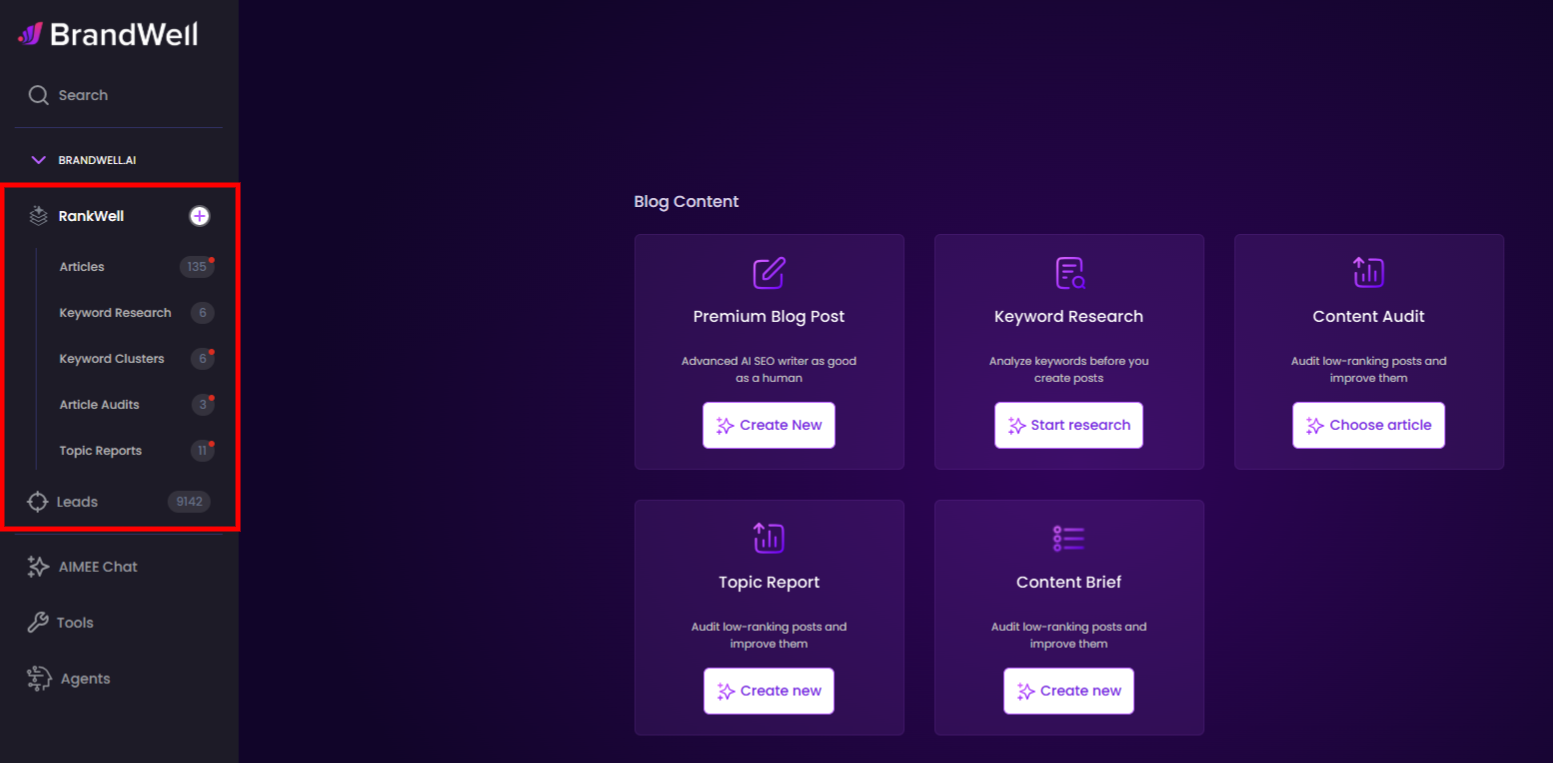
To start using BrandWell, go to RankWell and create a project for your company or your client. Input the website name, URL, target audience, language, and location.
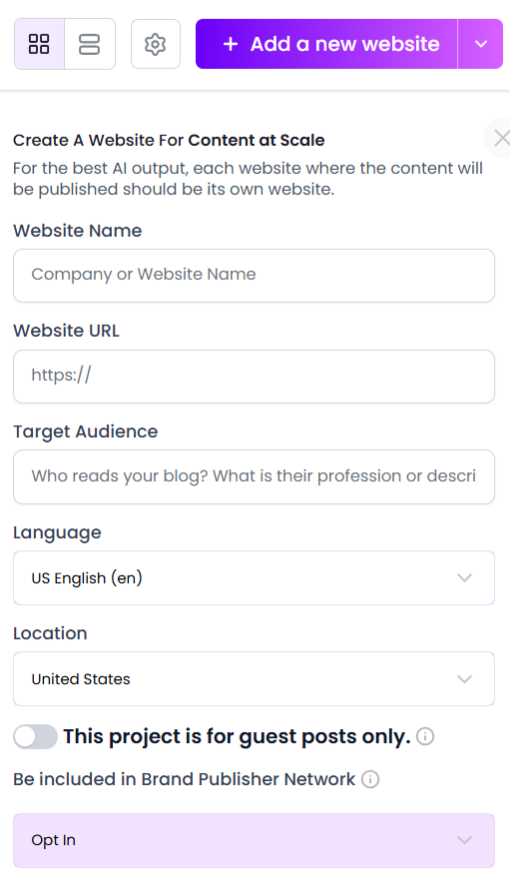
Next, go to Project Settings and set up how you want RankWell to write your blog posts by describing your brand, your target audience, and your tone of voice.
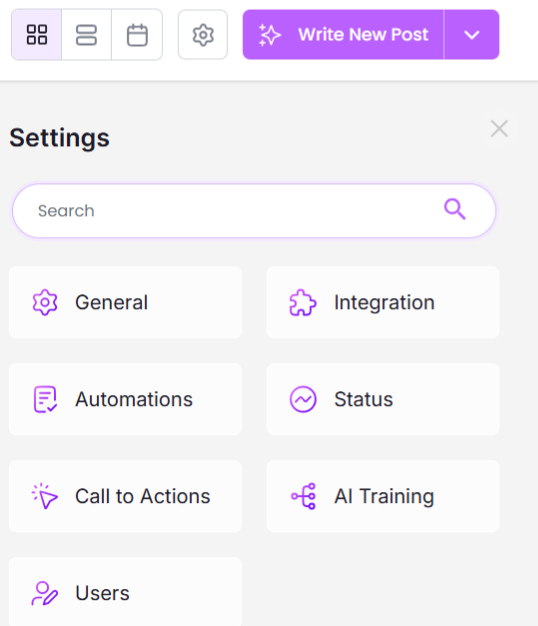
To train the AI to write like you, upload samples of your work to the AI Training console. This ensures that every blog post RankWell generates for this particular project follows this brand style.
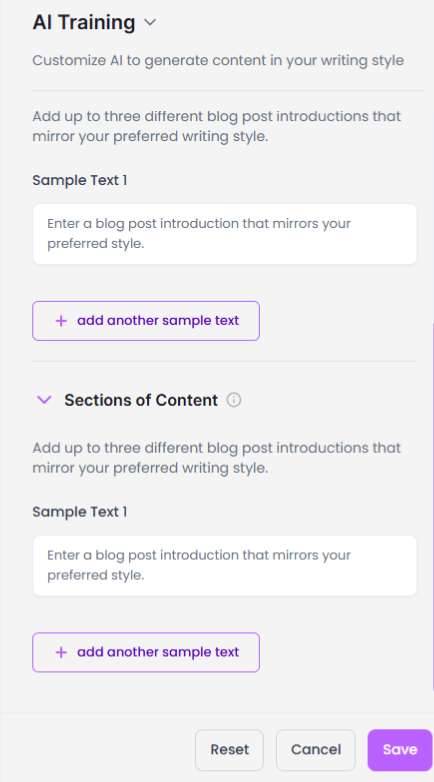
After this initial setup, creating blog posts with RankWell should be a breeze. Just enter a keyword or URL and click the “Write Article Now” button. That’s it. You can even use the bulk upload feature and run up to 100 keywords simultaneously.
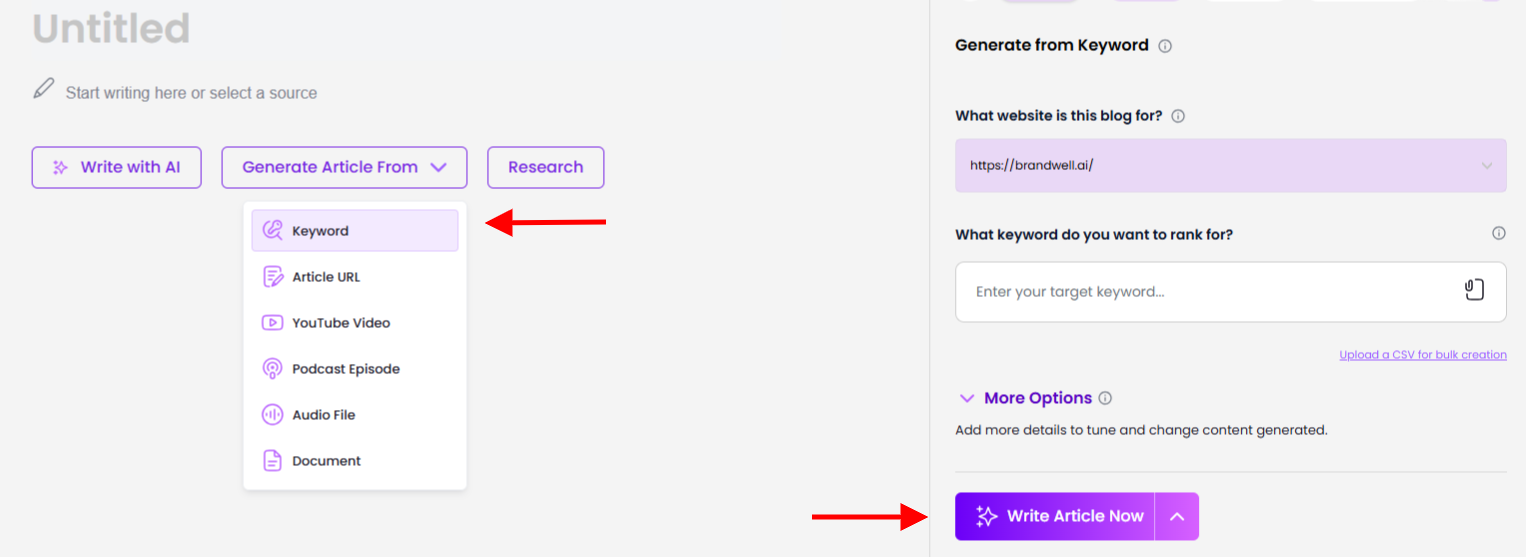
RankWell is one of the few AI writers that produce nearly publish-ready long-form articles. Everything is done for you: meta title, meta description, URL slug, introduction, H2-H4 headers, bullet points/numbered lists, internal and external links, and conclusion.
You can even set up RankWell to automatically generate key elements such as a table of contents, key takeaways, clicks to tweet, an FAQ section, and a custom CTA with links to your website or landing page.
While going through your draft, you’ll have access to an entire suite of SEO and publishing tools on the same interface, which cuts down on tool-switching and workflow friction.
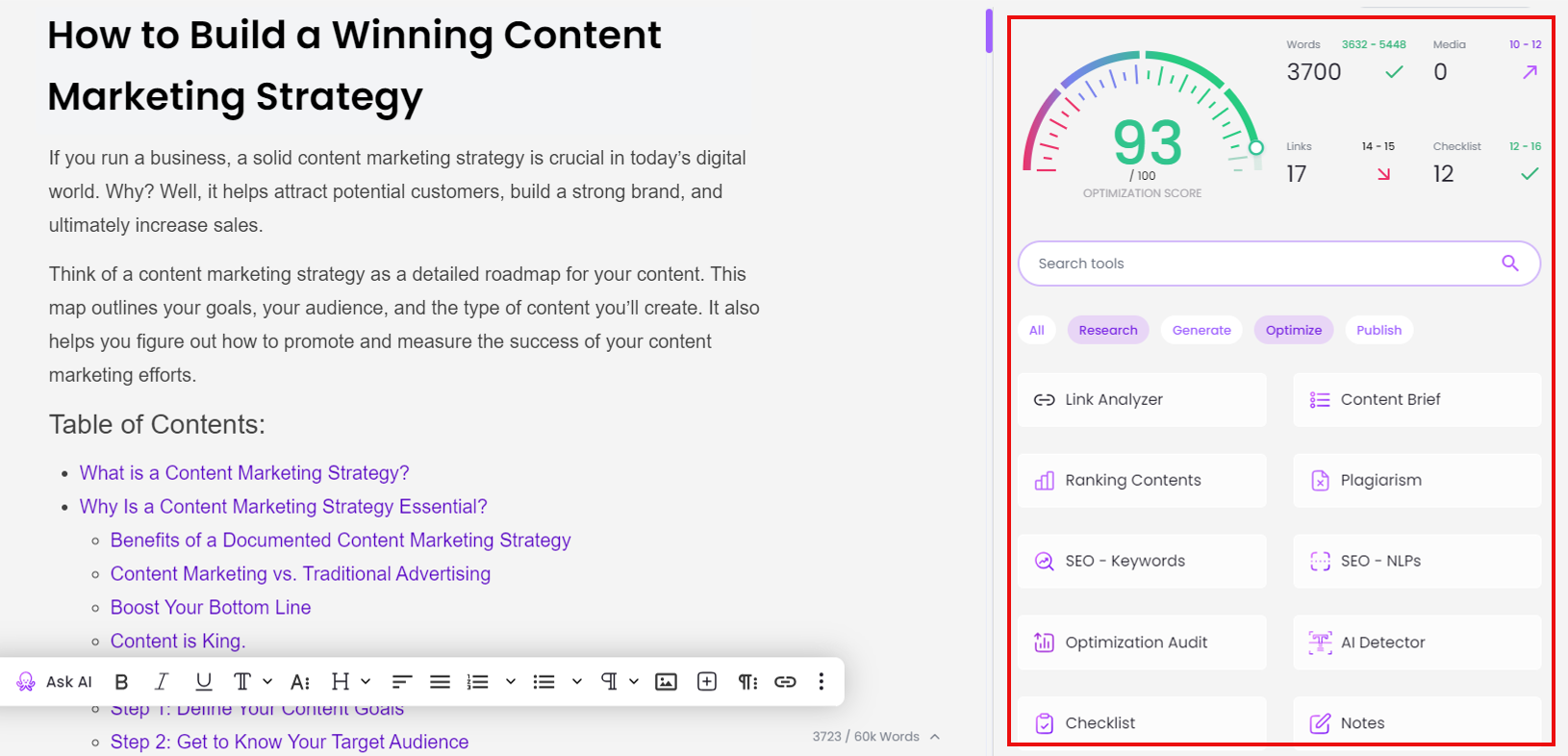
When you’re done editing and optimizing, just click Publish to automatically post your article on your WordPress or Shopify blog or export it in Word, Docs, or HTML format.
Now, getting started with Anyword looks a little similar. It also involves setting up your integrations, target audience, and tone of voice before you generate anything.
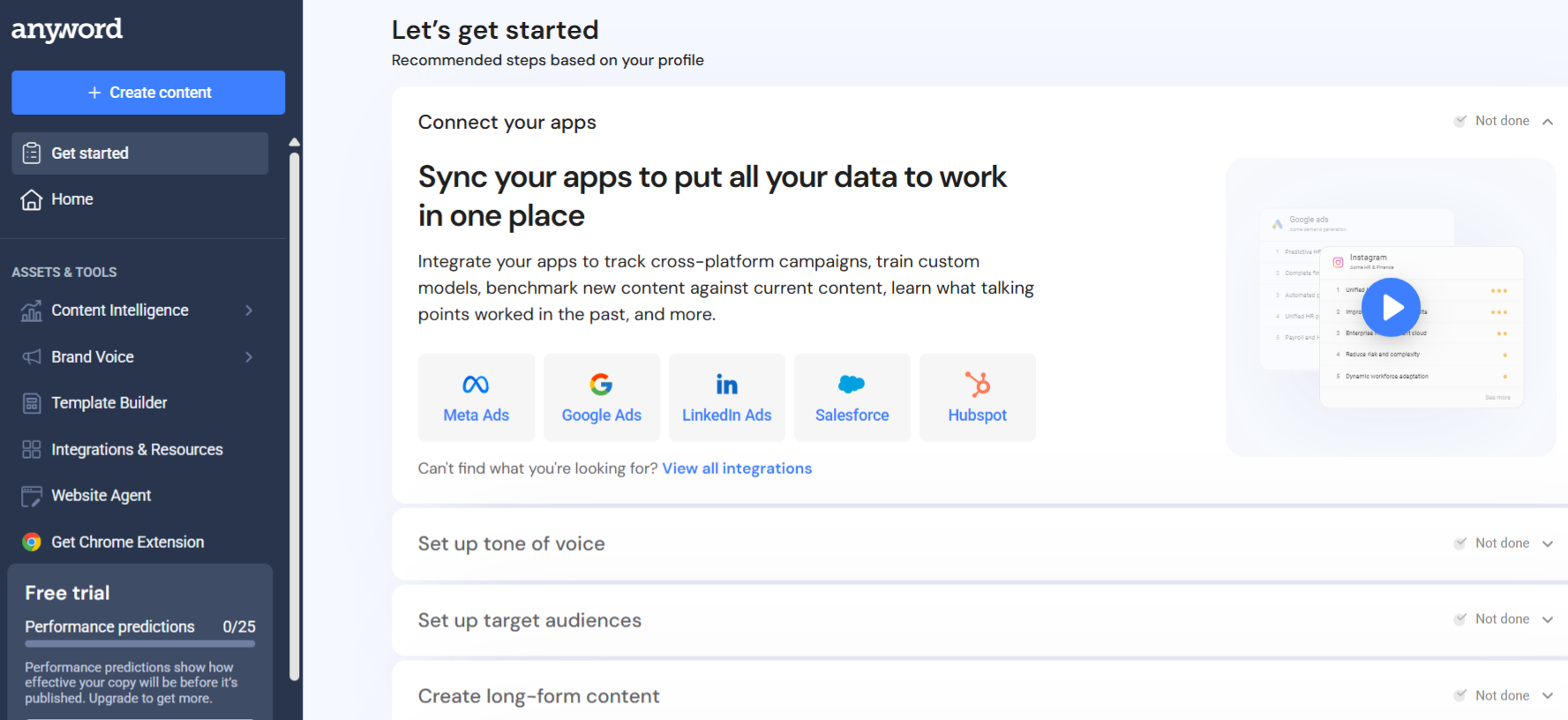
When you’re done with the initial setup, click the Create Content button on the top left, select whether you’re writing long-form or short-form, and write your instructions in the prompt box. You can also choose from the template gallery or your saved templates.
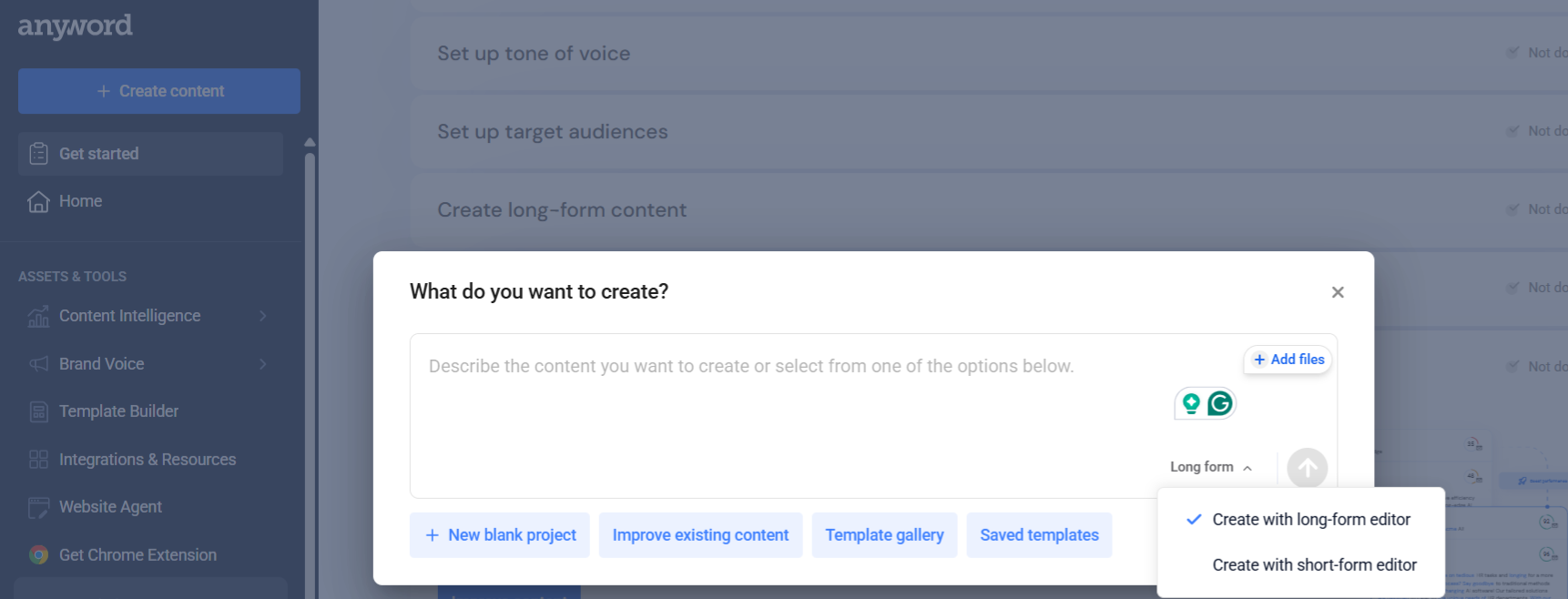
Generating long-form content with Anyword takes more steps than the single-keyword input process of BrandWell.
First, you have to describe the content that you want to create. Then choose a word count or let the AI decide.
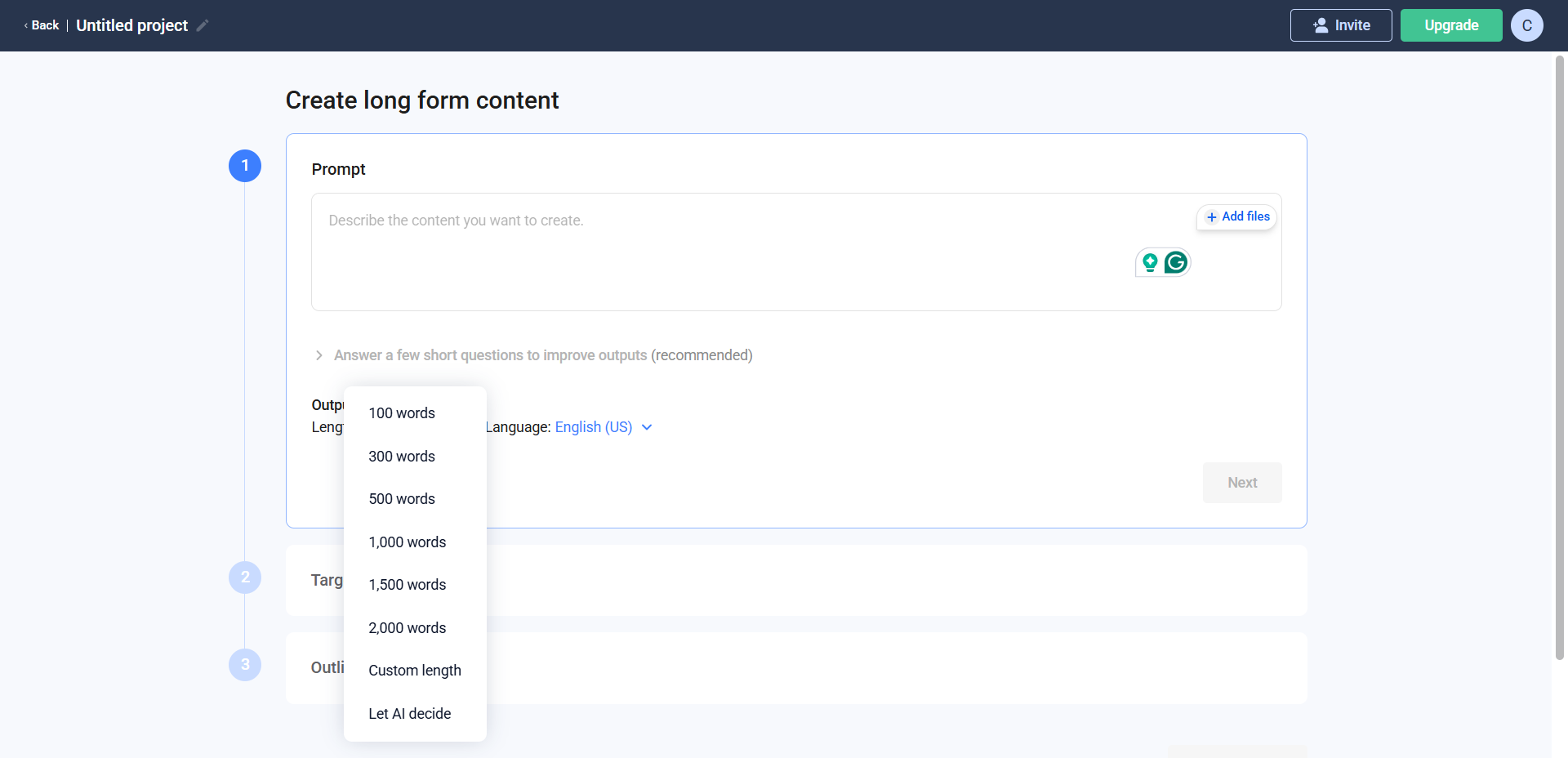
The next step is choosing a target audience. You can select the default broad audience or create a custom persona.
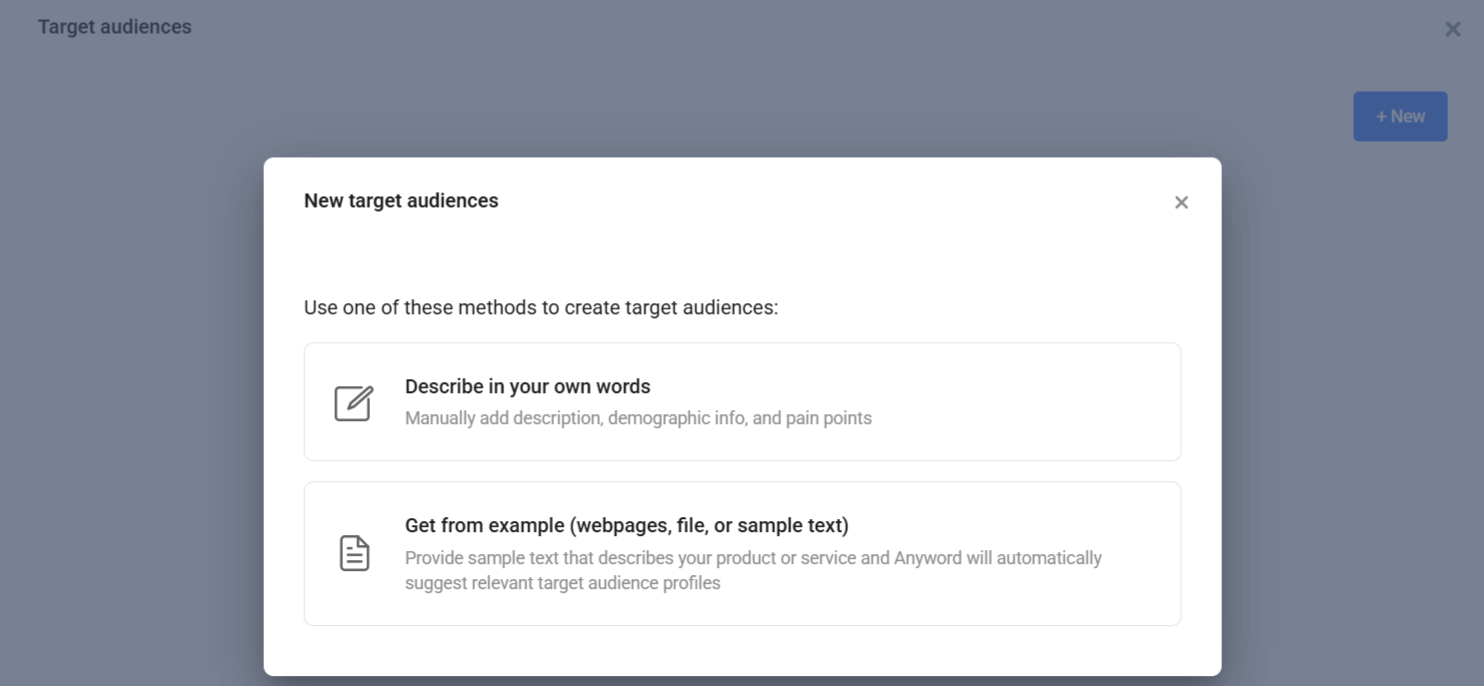
After you click Next, the AI will begin generating an outline for your article. Here you can add more section headers, change the tone of voice, and input your structure, vocabulary, or formatting instructions.

When you’re done customizing each section, click the “Generate” button at the bottom to create your draft.
When it comes to generating long-form content, the difference in workflow between BrandWell and Anyword is immediately noticeable.
With BrandWell, it’s as straightforward as it gets: enter a keyword, and you’re off. The platform auto-generates a complete SEO-optimized blog draft with no need to babysit the process. It’s built for speed and simplicity, making it easy to go from idea to publish-ready content in one fluid session.
In contrast, Anyword takes a more involved route. To generate a blog, you’ll need to go through three manual steps:
- Write a detailed prompt describing what the blog should cover.
- Create or select a custom target audience, complete with tone preferences and campaign intent.
- Manually review and edit the outline, section by section, before it starts generating a full draft.
While this gives you more control upfront, it adds friction, especially if you’re trying to move fast or generate content at scale. The interface is clean, but the workflow can feel rigid and time-consuming, particularly for teams who need to produce high volumes of content quickly.
Bottom line:
- BrandWell is ideal for marketers who want a fast, intuitive blog creation process without sacrificing quality.
- Anyword suits users who prefer a highly structured setup and are willing to invest more time upfront for granular control.
Content Quality and Accuracy
Now, which tool produces better copy? And how much editing does it need?
BrandWell stands out for its human-like tone and contextual awareness. Whether you’re creating long-form blog content or short-form copy, the output feels natural especially when using the platform’s task-specific agents.
BrandWell is superior at capturing and applying your specific brand voice across diverse content formats. If maintaining a consistent brand is your top priority, BrandWell will likely give you better results that resonate with your audience.
The copy tends to follow a clear structure, stay on-topic, and include relevant details without much fluff. AIMEE, the chatbot, also helps refine tone and rewrite specific sections without needing to regenerate the entire piece. It’s particularly strong for storytelling, educational content, and multi-step messaging like email sequences or campaign funnels.
Meanwhile, Anyword delivers performance-tuned copy that’s sharp, concise, and often ready to publish. Its predictive scoring system helps you zero in on the most impactful variations. If your main objective is creating content that boosts conversions and sales, Anyword’s data-backed suggestions offer a distinct advantage.
That said, longer-form content like blogs or landing pages may require more hands-on editing to enhance flow and structure. While the content is data-backed, it can sometimes lean generic unless you fine-tune the inputs.
In summary:
- BrandWell is ideal for nuanced, brand-aligned content that sounds like it came from a human writer.
- Anyword excels at generating quick, high-performing copy snippets, especially when conversion is the goal.
SEO Capabilities
Which platform gives your content the best shot at ranking, and how hands-on do you need to be?
When it comes to SEO, BrandWell and Anyword approach it very differently. One focuses on strategy and structure, while the other emphasizes keyword inclusion and performance insights.
BrandWell offers a full SEO suite through its RankWell long-form writer, and it’s surprisingly robust. You get keyword research, content briefs, topic reports, real-time optimization, and even automatic internal linking. And while you’re editing your post, you have an entire array of SEO tools on the right column for checking your links, adding more in-depth content, adding images, optimizing keywords, detecting plagiarism, NLP analysis, and more — without disrupting your workflow.
Meta titles, descriptions, and even URL slugs are auto-generated, and RankWell continuously scores your content based on readability, on-page SEO, and structure. For agencies or marketers who manage blogs, landing pages, or large content libraries, it saves a ton of time without sacrificing quality.
Anyword offers solid SEO support through its Blog Wizard and Long-Form Editor, which help you structure articles around keywords and optimize sections based on predicted engagement. Type in a prompt and the tool will build out a rough outline and generate paragraphs accordingly.
However, it doesn’t offer the same level of depth as BrandWell. There’s no integrated keyword research, topic clustering, or live SEO scoring. If your focus is content performance over ranking, it does a great job. But for technical SEO or scalable content planning, it’s more of a supportive tool than a full SEO engine.
Quick comparison:
- BrandWell is a great fit if SEO is a core part of your content strategy and you want built-in tools to help plan, optimize, and publish.
- Anyword is better suited for teams that want basic keyword inclusion and scoring within a more performance-focused writing flow.
While neither tool may replace dedicated keyword tools or platforms like Semrush or Ahrefs, their built-in capabilities are a huge asset. They provide the foundation for solid on-page SEO.
Integration and Compatibility
Both BrandWell and Anyword offer useful integration capabilities, but Anyword currently has a broader range of connections. It works seamlessly with major sales and marketing platforms, including Google Ads, Instagram, Salesforce, Marketo, Outreach, and Drupal, making it a powerful addition to any tech stack used by businesses running multiple campaigns. It also makes performance tracking and variation testing easy to sync, which is especially useful for advertisers or growth marketers who are running A/B tests at scale.
BrandWell takes more of an “everything in one place” approach. The platform is designed so that most of your content creation, SEO, and publishing workflow happens inside the tool. You can plan, write, optimize, and publish directly to your WordPress or Shopify site, maintaining brand alignment across their entire digital presence.
A tool’s ability to fit into your existing content planning and publishing process is vital. Before choosing, consider your current tech stack. A seamless content experience depends on how well a new tool can communicate with the platforms your team already uses daily.
Customer Support and Resources
When you need help (or just a little onboarding guidance), who’s got your back?
Both BrandWell and Anyword offer solid support options, but they differ in how hands-on and accessible their help resources are.
BrandWell offers a mix of self-service and human support. The platform includes a clear, easy-to-navigate knowledge base that covers everything from getting started to advanced workflows with RankWell and the AI agents. When you hit a wall or need more personalized help, live human customer support is available through the in-app chatbox. The team is responsive and knowledgeable, especially when it comes to troubleshooting SEO features or customizing AI outputs. For agencies or marketers managing multiple clients, this kind of support can be a real time saver.
Anyword is more self-serve-oriented. Its Quickstart Guide helps you get up and running quickly, especially for generating ads, emails, or blog posts. The Anyword blog is also a great resource, packed with use cases and optimization tips. While live support isn’t front and center, most users can get what they need from the documentation and walkthroughs. It’s efficient and informative but may not be ideal if you prefer direct human help or encounter a workflow-specific issue.
Summary:
- BrandWell provides more hands-on customer support with a human touch, which is great for users who want help adapting the tool to their specific workflow.
- Anyword offers strong self-guided onboarding and learning resources, ideal for independent users who like to figure things out quickly on their own.
Pricing and Value
Which tool gives you more bang for your buck?
Both BrandWell and Anyword offer powerful features, but their pricing structures( and the value you get at each tier) are built for slightly different types of users.
BrandWell offers two flat-rate tiers:
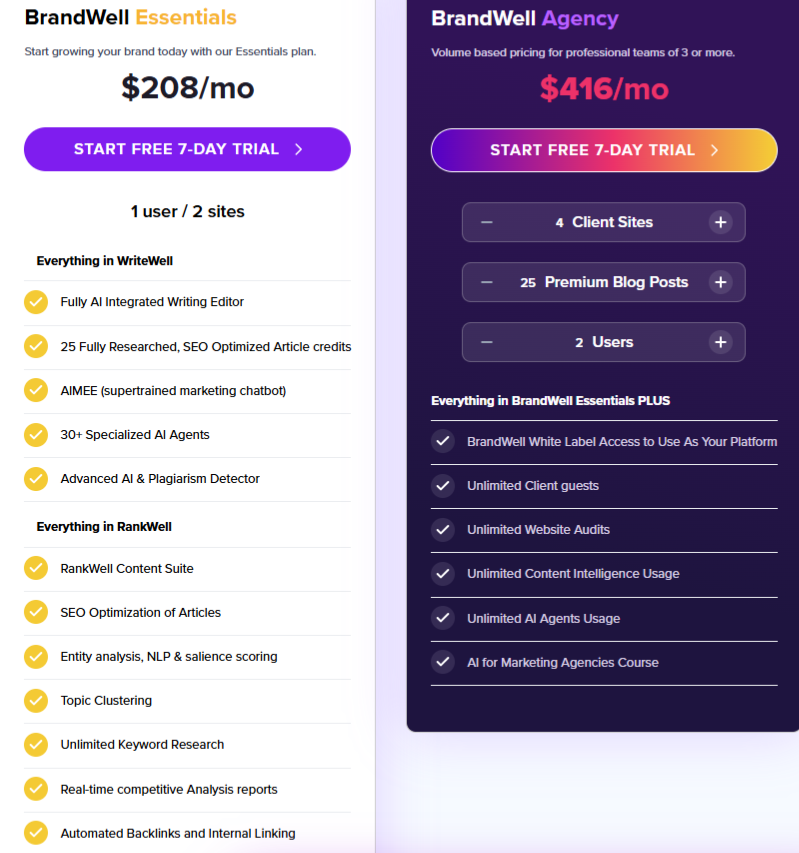
Both plans include everything in one package, so there’s no nickel-and-diming based on features. The value here comes from consolidation as BrandWell replaces multiple tools (AI writer, SEO tool, brief generator, CMS add-ons), which can justify the price if you’re using it as your primary content engine.
Anyword uses a more tiered pricing model:
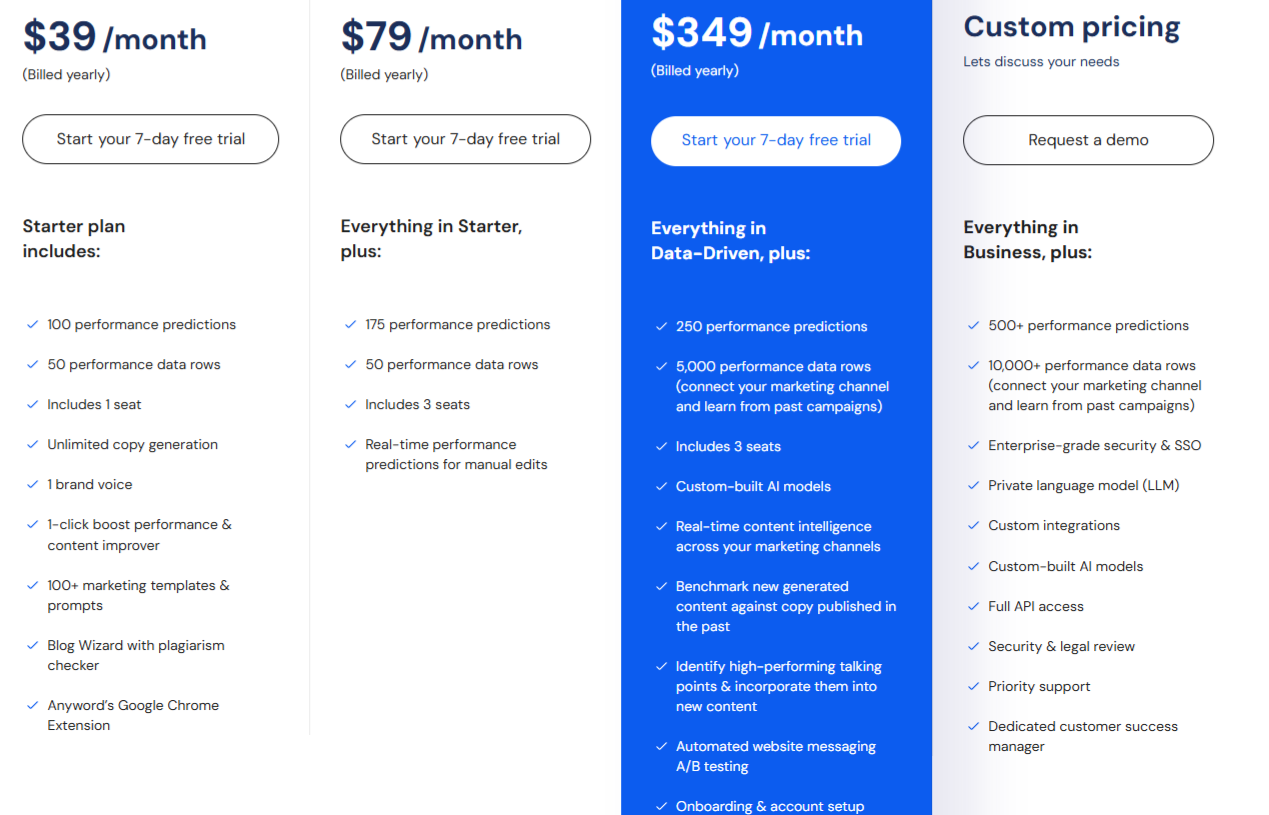
This pricing structure offers more flexibility upfront, especially if you’re focused on a specific use case (like running ads). However, core features like performance prediction are locked behind the mid-tier or higher.
Both platforms also offer custom enterprise pricing for larger teams or companies with specific needs.
In summary:
- BrandWell offers an all-in-one workspace at a higher entry price but replaces several tools, best for marketers and agencies who want everything in one platform.
- Anyword has lower-cost entry points and modular pricing, great for performance marketers focused on short-form copy or testing variations before scaling up.
The Verdict: BrandWell vs Anyword
Deciding between BrandWell and Anyword depends entirely on your team’s priorities and content goals. If your primary challenge is maintaining a consistent brand voice across all your media content, BrandWell is likely the superior choice. Its features are built to support a cohesive brand identity, making it perfect for businesses that want every blog post and social update to sound right.
However, if your main objective is to create high-converting content backed by data, Anyword is the stronger contender. Its predictive performance scores and A/B testing features are made for marketers who need to boost performance and demonstrate ROI. Its ability to improve search rankings and drive conversions makes it a powerful asset for any data-driven content strategy.
Which Tool Should You Choose?
BrandWell and Anyword are both excellent AI platforms, but they’re built with different goals in mind. Choosing the right one depends on your workflow, content priorities, and how hands-on you want to be.
Choose BrandWell if:
- You want an all-in-one content and SEO solution in a single platform.
- Your team creates a wide range of content: blogs, landing pages, emails, social posts, and SEO pages.
- You value brand voice consistency and need built-in collaboration tools.
- You’re looking to replace multiple tools (SEO software, writing assistants, brief builders) with one workspace.
BrandWell is best suited for agencies and in-house teams that need structure, flexibility, and strategic content execution, without juggling a dozen separate tools.
Choose Anyword if:
- You’re focused on performance-driven copy, especially for ads, product pages, or emails.
- You want real-time predictive scoring to test messaging before it goes live.
- You’re looking for lower-cost entry points or specific use-case support like ad creation.
- You already have a tool stack and want something that integrates cleanly with it.
Anyword is a smart pick for growth marketers, paid media specialists, and conversion-focused teams who need fast, high-impact content with measurable performance insights.
Whether you’re scaling content across multiple channels or optimizing every headline for conversions, the right AI tool can make all the difference.
BrandWell and Anyword both bring serious strengths to the table, now it’s just a matter of choosing the one that fits your goals.
👉 Want to see BrandWell in action? Check out BrandWell here and explore what an all-in-one AI writing and SEO workspace can do for your team.
[cm name=”no_more_shitty_content”]

